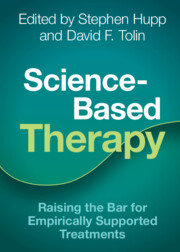Book contents
- Science-Based Therapy
- Series page
- Science-Based Therapy
- Copyright page
- Dedication
- Contents
- Tables
- Contributors
- Preface
- Acknowledgments
- 1 What Is Science-Based Therapy?
- 2 Depressive Disorders
- 3 Bipolar Disorder
- 4 Anxiety Disorders
- 5 Obsessive-Compulsive Disorder
- 6 Posttraumatic Stress Disorder
- 7 Dissociative Disorders
- 8 Pain
- 9 Eating Disorders
- 10 Insomnia Disorder
- 11 Sexual Dysfunctions
- 12 Substance Use Disorders
- 13 Cognitive Loss
- 14 Antisocial Behavior
- 15 Borderline Personality and Other Personality Disorders
- 16 Psychosis and Schizophrenia
- 17 Autism Spectrum and Intellectual Developmental Disorder
- 18 Attention-Deficit/Hyperactivity Disorder
- 19 Tic Disorders
- 20 Couples Discord
- 21 Psychotherapy Relationships
- Postscript
- Index
- References
15 - Borderline Personality and Other Personality Disorders
Published online by Cambridge University Press: 10 January 2025
- Science-Based Therapy
- Series page
- Science-Based Therapy
- Copyright page
- Dedication
- Contents
- Tables
- Contributors
- Preface
- Acknowledgments
- 1 What Is Science-Based Therapy?
- 2 Depressive Disorders
- 3 Bipolar Disorder
- 4 Anxiety Disorders
- 5 Obsessive-Compulsive Disorder
- 6 Posttraumatic Stress Disorder
- 7 Dissociative Disorders
- 8 Pain
- 9 Eating Disorders
- 10 Insomnia Disorder
- 11 Sexual Dysfunctions
- 12 Substance Use Disorders
- 13 Cognitive Loss
- 14 Antisocial Behavior
- 15 Borderline Personality and Other Personality Disorders
- 16 Psychosis and Schizophrenia
- 17 Autism Spectrum and Intellectual Developmental Disorder
- 18 Attention-Deficit/Hyperactivity Disorder
- 19 Tic Disorders
- 20 Couples Discord
- 21 Psychotherapy Relationships
- Postscript
- Index
- References
Summary
Patients with personality disorder, especially borderline personality disorder, are challenging for psychotherapy. Yet there is good evidence that most patients can recover if offered specific forms of specialized therapy that are empirically supported treatments. The majority of research studies in personality disorder have focused on borderline personality disorder, and we have only limited data on other categories. The strongest findings for the efficacy of treatment concern dialectical behavior therapy, but other options may yield similar results. Credible components include teaching emotion regulation skills and a present-oriented focus. Some of the effects of effective therapy could be specific to underlying theory and methods, while others may depend on common factors. A sidebar discusses self-injurious thoughts and behaviors in youth.
Keywords
- Type
- Chapter
- Information
- Science-Based TherapyRaising the Bar for Empirically Supported Treatments, pp. 265 - 281Publisher: Cambridge University PressPrint publication year: 2025
References
Useful Resources
Choi-Kain, L., Sharp, C. (2021). Handbook of good psychiatric management for adolescents with borderline personality disorder. American Psychiatric Publishing. (up-to-date book on adolescent PD)
Linehan, M. M. (2014). DBT skills training manual (2nd ed.). Guilford. (an essential guide to DBT)
Paris, J. (2020). Treatment of borderline personality disorder (2nd ed.). Guilford. (up to date summary of the research literature)
Porr, V. (2010). Overcoming borderline personality disorder: A family guide for healing and change. Oxford University Press. (best book for families and patients)

